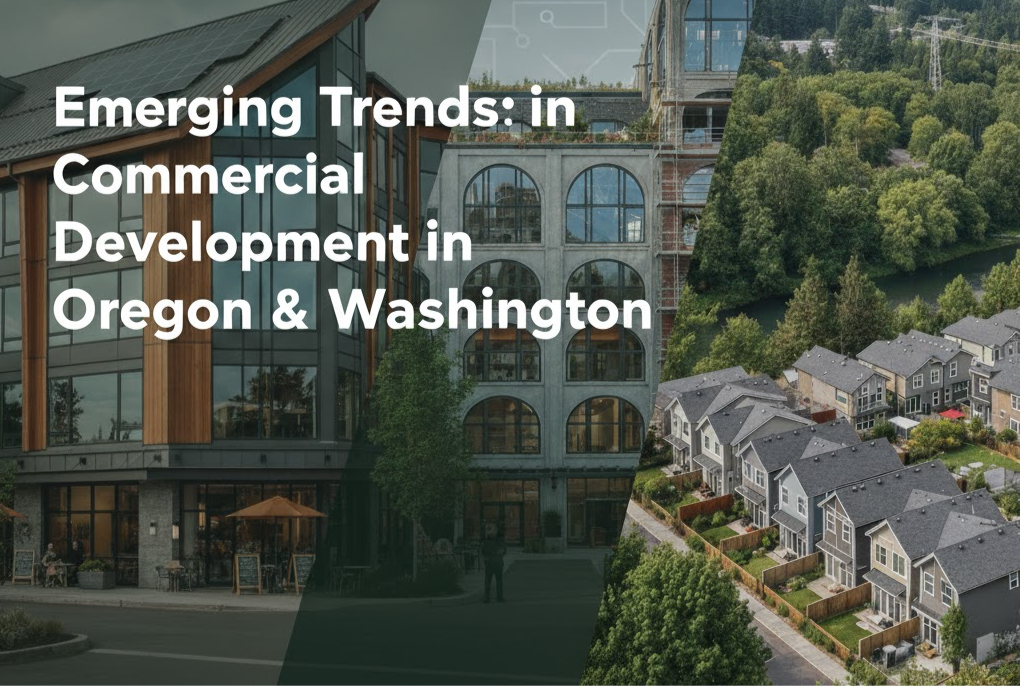Emerging Trends in Commercial Development in Oregon & Washington

As the Pacific Northwest continues evolving, we believe commercial development in Oregon and Washington is at a pivotal moment. Along with developers, investors, and planners we are seeing shifts in policy, market demand, and sustainability expectations. For those looking to build or enhance commercial projects, staying ahead of these trends isn’t optional—it’s essential. Here are some major forces shaping the region, and how BC Group supports you in navigating them.
1. Permitting Reform & Clearer Zoning Rules
In Washington State, new legislation is streamlining land use and permitting processes. ESSB 5611, for example, clarifies permitting workloads for local governments and expands the definition of commercially zoned property to include sites that conditionally allow multifamily residential uses.
Similarly, there is momentum behind bills aiming to require development regulations that are clear and objective, reducing uncertainty in permitting decisions.
These changes are critical—delays in approvals and unpredictable zoning can add months (or worse) to project timelines. Developers in Oregon and Washington need to pay close attention to these regulatory shifts.
2. Adaptive Reuse & Office Conversions
Post-pandemic shifts in how and where people work have left many downtown office buildings underused. In Portland, office vacancy rates have climbed considerably, making office conversions into multifamily or mixed-use projects increasingly viable.
In Whatcom County, Washington, office property losses are opening up opportunities to repurpose or adapt buildings—turning once single-use office blocks into housing, co-working or retail, or community spaces.
Adaptive reuse not only helps fill real estate and housing gaps but can also offer tax incentives and align with sustainability goals.
3. Sustainability & Green Building as Competitive Advantage
Green building isn’t just a buzzword here—it’s a driving force. Developers are seeing stronger returns when incorporating energy efficiency, renewable energy, and eco-friendly design. In Oregon, recent laws like House Bill 2021 push electricity providers to reduce greenhouse gas emissions, increasing the demand for more sustainable commercial structures.
Investing in green design—LED lighting, efficient HVAC, solar integration, high-performance insulation—yields lower operating costs, potential tax credits, and improved marketability. For tenants and communities increasingly aware of climate change, sustainable buildings also help attract higher quality tenants and tenants willing to pay a premium.
4. Demand for Multi-Family & “Middle Housing”
While purely commercial projects remain important, there’s growing demand for mixed-use developments and multifamily housing—especially in urban and suburban nodes. In Portland, multifamily projects are stabilizing with lower vacancies compared to other building classes. Rental demand is being buoyed by younger demographics who favor walkable neighborhoods, amenities, and flexibility.
In many communities, “middle housing” (townhomes, duplexes, small apartment buildings) is emerging as a way to deliver density without high-rise scale, responding both to zoning reforms and housing shortages. Oregon especially has seen zoning evolve to allow more of these types of development.
5. Hotspots Beyond the Major Metro Areas
Not all opportunity lies in Seattle, Portland, or Vancouver-Clark County. Smaller cities and rural areas are seeing outsized commercial investment.
- Prineville, Oregon, is a standout example: its role as a data-center hub has driven major capital projects in industrial/commercial infrastructure.
- Redmond, Oregon is growing in retail, hospitality, and mixed-use districts along with office investment—even though it’s smaller than Portland.
Developers who expand their focus beyond the core metros may discover lower land cost, fewer regulatory constraints, and potentially higher margins—especially in industrial, retail, hospitality, or mixed-use sectors.
What BC Group Can Do for You
BC Group works with developers, municipalities, and capital partners to capitalize on these trends. Whether you’re converting office to apartments, building mixed-use retail, or exploring sustainable building systems, our team helps you:
- Understand and leverage recent zoning and permitting reforms
- Evaluate adaptive reuse opportunities and calculate ROI
- Oversee the construction of green, energy-efficient facilities that meet or exceed code
- Identify emerging commercial hotspots for strategic investment
If you’re planning a new project in Oregon or Washington, whether it’s commercial, mixed-use, healthcare, affordable or multifamily, we’d love to talk through your vision and how to navigate the changing regulatory and market landscape with confidence.
